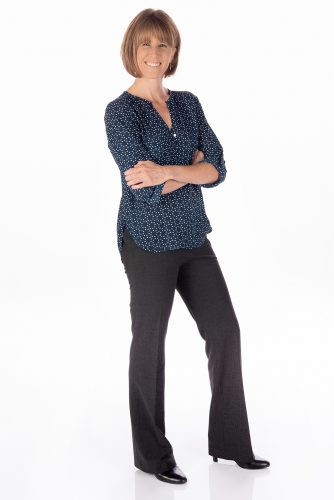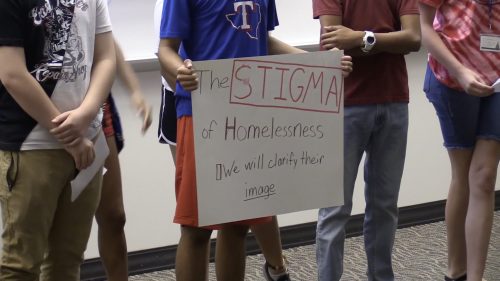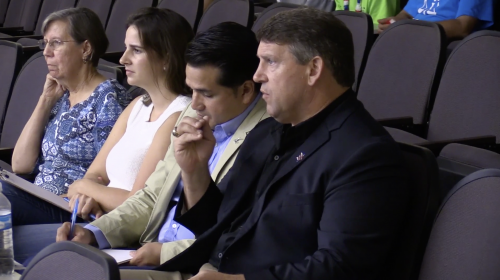Michelle Bauml: Social Studies Activist
The Winter Professor in Early Childhood Education leverages her experience as an elementary school teacher to create broad educational — and social — change.
Michelle Bauml: Social Studies Activist
The Winter Professor in Early Childhood Education leverages her experience as an elementary school teacher to create broad educational — and social — change.
Your specialty is the field of social studies education. Why is the subject an essential component of learning?
Where do I start? The lack of voter turnout, the lack of informed voter turnout, the lack of civic knowledge that the average person has. It’s really disheartening, and when I think about the future of our country, of our democracy, I worry that our students today are not being introduced to the level of education that is going to sustain us in the long run.
In Texas, social studies are not tested on a standardized test until eighth grade. So can you guess what elementary teachers focus on? It’s not social studies. In my classes, we talk about social studies as an endangered species.

Michelle Bauml started offering a civic education-minded summer camp called iEngage in 2016. Photo by Glen E. Ellman
You taught at a public elementary school for nine years before coming to TCU. What was the appeal of working with young children?
Brain development. So much happens when children are very young. In upper elementary grades, children are not learning to read. They are reading to learn.
You moved from Brazosport to Houston to work with newly certified teachers. What did you learn about educational disparities through that move?
One of the things I learned by moving to a much larger urban school district was the existence of a vast discrepancy of resources.
I would spend time in one school in one part of town and notice that the teacher didn’t have any working computers. Or, if the computer worked, the printers had been out of ink for months. I would go to another school on a different side of the city — in the same school district — and the teachers had all the resources you can imagine.
It really shocked and troubled me. I began to see and understand how children living in the same area can essentially receive very different educations. That is actually what compelled me to go to graduate school and earn a Ph.D.
Did anything else inspire you to join the professoriate?
I was drawn to the intellectual challenge of what being a professor means, which has to do with not only teaching the next generation of teachers but also really studying issues that impact the field of teaching and the outcome of teaching, which is the education of children.
What would you say are the challenges and benefits of working with children versus college students?
Some of the challenges are similar in that many students really want to excel and do well. You have to find the balance between offering the right amount of support and allowing the students to struggle a little bit so that they take ownership of their learning. Young children are enthusiastic about so much. You can introduce topics in a creative way so you can really hook them into learning. College students are starting to take their futures seriously. When you can help them identify what their goals are and then assist with those goals, it’s really empowering and exciting.
In past research, you studied elementary school teachers’ attitudes about standardized curricula. What did you learn?
I learned that the teachers work very hard to try to do their jobs well. I became very frustrated as a classroom teacher with the pressure to make sure that my students were able to excel on standardized tests.
I worked hard as a classroom teacher to be able to provide creative and authentically interesting lessons and challenges for my students. But the testing pressure — I felt that very much.
As I left the classroom, I realized that many school districts provide teachers with a curriculum guide that’s very scripted, and it limits opportunities for teachers to make decisions based on their own students’ strengths and areas for growth.
Are public schools becoming more standardized? If so, is this a good development?
When the curriculum does not allow teachers enough wiggle room to be decision-makers, that’s a problem. My view of teachers is one of confidence, overall. I tend to give teachers the benefit of the doubt, and I tend to look at them as, in general, capable decision-makers who can tell what their students need and then meet those needs.
I feel like testing — standardized testing in particular, which is a requirement in public schools — has had an effect on the climate of schools and on the profession of teaching. It’s really limiting teachers in terms of what they are able to accomplish. I would love to see teachers have more opportunities to be curriculum decision-makers.
You’ve also studied beginning teachers’ reluctance to work in minority-majority schools. What did you learn?
We interviewed teacher candidates and asked what kind of school they could envision themselves teaching in. In many cases, a college student’s own schooling experience is the image they have when they picture themselves teaching.
So, if a [college] student went to a private school, then they envision themselves teaching at a private school, or they envision the students representing that private school experience. If a [college] student went to an inner-city school, they often will envision themselves teaching at a similar kind of school.
I was at TCU for a year before I realized that not all of my students have the same background. I really needed to look at their diverse experiences and bring that into the classroom.

At the iEngage camp, students participate in group projects. This group’s project, “Homelessness: Ending the Stigma,” focuses on populations of homeless veterans and children born into homelessness. Photo by Zach Martino
With the assistance of the Hatton W. Sumners Foundation, you started offering the civic-education-minded iEngage summer camp at TCU in 2016. What was so appealing about a camp intended to encourage kids to become leaders in their communities?
I appreciated that iEngage was targeting middle schoolers because they’re at such an interesting age. They’re starting to think about themselves in relation to the world, and they’re old enough to talk about difficult topics, like refugees and migration and homelessness, in a sophisticated way. I could see that this kind of a project had so much potential in terms of benefits for the children attending, for their futures and for the community at large — because now we have a population of young people who are taking interest in their communities.
The point of the iEngage camp is to teach middle schoolers to engage with complex social issues. How do they acquire these skills?
We invite guest speakers from various organizations and nonprofits to talk to our students about issues in the community and what is already being done about them. For example, the Tarrant Area Food Bank provides a 20-minute presentation about why people are hungry, what the numbers are in the county in terms of how many people they’re able to feed, and how the process works in terms of donations and distributing food.
We also take a field trip, in the past to City Hall. They heard from city leaders and city council members. Fort Worth Mayor Betsy Price has addressed them about leadership and being active in the community.
TCU students serve as camp counselors and help small groups of campers come to a consensus on what topic they will study for the rest of the week. They then research the topic. They ask questions. They find how prevalent it is. They look for root causes, which is intellectually challenging for our middle schoolers. We’re really trying to avoid a simple solution and to encourage the campers to think deeply about these issues and then propose a solution.

Students present their group advocacy topics in a Shark Tank style with a panel of community leaders providing feedback. Photo by Zach Martino
Have any of the topics the middle-school campers chose surprised you?
Cyberbullying. They were willing to unpack that topic and really consider cyberbullying as a real issue and to come up with some solutions.
TCU’s College of Education has an almost 100 percent job placement rate. How?
Our program is high-quality. Our students who are early childhood education majors all take a specialized course in teaching students with special learning differences, a special education methods course. And all of our students in the early childhood program also take an English as a second language course. This is just one example of how our program and our faculty continue to seek to improve year after year.
The caliber of our students also speaks very highly of us. Our expectations are high for them to be admitted and very high to stay in the program. Our field experiences go well above and beyond what the state of Texas expects. We put our future teachers in schools regularly from the first year that they are on campus.
We say, if you do a good job here, go through this program and take it seriously, you will be sought-after.
If you had to pick one most important thing that future teachers need to know, what is it?
Get to know your students. I believe you really need to try to establish positive relationships with your students, because through those positive relationships you can learn about the students’ academic needs, which is your primary job, but you can also learn about what’s going on with them socially and emotionally and behaviorally.
— Caroline Collier
Editor’s Note: The questions and answers have been edited for length and clarity.

Your comments are welcome
2 Comments
The first and last statements by Professor Bauml cannot be over emphasized. Educationing our children is the single most important thing we can do as a nation. Professor Bauml is a TCU treasure. Her students should appreciate her experience and cogent thoughts.
Wayne Dunn ’68
Related reading:
Campus News: Alma Matters, Research + Discovery
Michelle Bauml Prepares Teachers for Urban Settings
The education professor helps lead the way in best practices for multicultural education.
Features
Starpoint School’s Special Education
At age 50, the on-campus lab school is still giving students a chance to shine.
Features
KinderFrogs Overcome Developmental Delays
Preschoolers with Down syndrome prep for traditional classrooms.